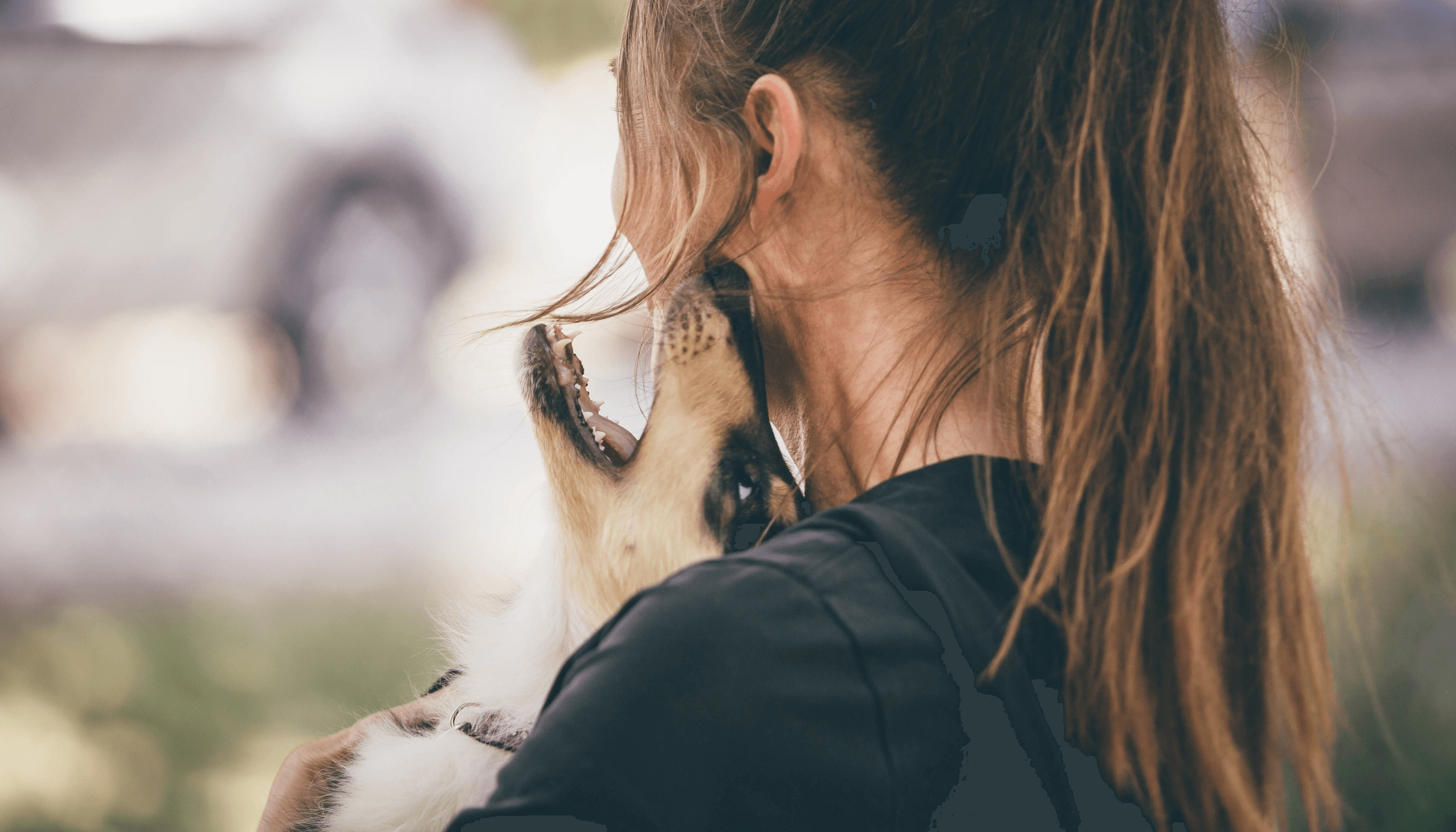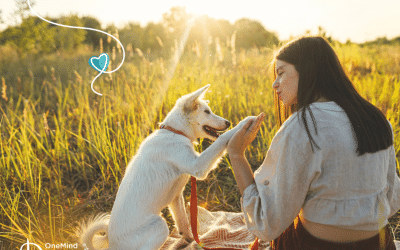If you asked any new puppy parent what the most frustrating thing about raising a puppy is, we bet they’d say “I wish my puppy would stop biting”.
It’s one of our top themes that our customer service team gets questions about, and honestly, every OneMind Dogs team member has dealt with it once, twice, or in Jenni’s case, seven times!
In this article, we’ll get into the reasons why puppies bite, and how you can teach them to stop.
For a more detailed guide, download our FREE eBook: The Ultimate guide to stopping puppy biting and chewing
Why do puppies bite?
Before we can stop puppies from biting, we need to understand why they bite. Biting is a natural behavior for puppies. It might suck for us humans (because damn, those baby teeth hurt) but we have to understand that when a young puppy bites a human, in almost all cases it’s not because they’re aggressive — even when it might seem like it.
Puppies aren’t ‘naughty’ on purpose or out of spite, and it’s up to us to spend the time understanding their point of view, and training them properly.
The main (and super normal) reasons your puppy bites you:
- Puppies use their mouth to explore the world (just like human babies!)
- When puppies and dogs play, they use their mouths to get the other dog’s attention
- Some breeds, like herding dogs, are genetically predisposed to chasing and nipping things (like ankles — ouch)
- From about 12 weeks of age, puppies go through an uncomfortable and sometimes painful teething experience — which can lead to even more biting
When you’re deep in the trenches of puppyhood, you’re probably thinking: does this ever stop? Will my hands ever NOT look like they’ve been mauled by a tiny shark?
Luckily, the answer is yes. Puppies should naturally slow down and stop biting around 7 months of age, when all of their adult teeth are in, and they’ve learned to play with toys and appropriate chews.
So why teach them earlier, if they’re going to stop eventually? Not only will it make your life less frustrating (and painful!), it’s important to teach puppies bite inhibition as soon as they arrive home for the safety of you and others as they grow up.
How do you stop puppies from biting?
Let’s start with that thing we just spoke about: bite inhibition. What is it?
Bite inhibition is essentially teaching puppies how to control the strength of their bite — or teaching them that human skin is super sensitive and precious, and they shouldn’t touch it with their teeth.
With their puppy siblings, they learn pretty quickly: one puppy bites another too hard, they yelp because it hurts, and play stops for a moment before continuing. And each time, the puppies learn that whatever amount of bite force they used was a little too intense.
With humans, it’s not so simple. Whether we know it or not, some things people try to do actually encourage puppy biting, or cause the puppy to get even more crazy and excited. Things like pushing the puppy away, raising their voice.
Okay, let’s get into some strategies that will help you stop your puppy from biting. Eventually.
This blog post offers a quick peek into the OneMind Dogs puppy training program. Learn more with our FREE eBook: The ultimate guide to stopping puppy biting and chewing
Grab your free eBookStep 1: Interrupting
When your puppy bites something it shouldn’t — whether it be your clothes, hands, feet or objects they shouldn’t — the first thing you should do is interrupt them.
You can interrupt them by yelping (super high-pitched and loud, like a puppy would) as soon as their teeth touch your skin, or by saying ‘uh-oh’ if they’re biting an item they shouldn’t — before taking it away.
Step 2: Redirecting the puppy
Puppies bite because of a few reasons:
- They’re tired
- Their teeth hurt
- They just want attention
If your puppy seems to be wound up, overstimulated and biting like a crocodile in feeding season, ask yourself: could they be tired? Have they had enough naps today? If they’re not having 18-20 hours of sleep a day, start with that.
If your puppy’s teeth hurt because they’re teething, you can redirect them to a safe chewing toy like:
- Frozen stuffed Kong toys
- Frozen rag/towel that’s been soaked in broth
- Whole carrots (raw or frozen)
- Nylabones or teething toys
And if your puppy just wants attention or to play, redirection is super important. When they’re trying to use their teeth on you to play, immediately stop and redirect them to an appropriate toy, It might help if you make the toy exciting and interesting by moving it around, to encourage your pup to grab a hold and play with it. And, when they do, praise them so they know it’s the correct behavior!
Step 3: Ignoring the behavior
Next up is ignoring the behavior if it continues. Puppy’s using their teeth? Well, the play stops, fun stops, and attention stops.
Having an area that you can use to manage your puppy (like a puppy pen, a crate or a small area created with baby gates) is a godsend when you need a few minutes away from your puppy, or they need a safe space to calm down.
So, if your puppy is being relentless in their biting, remove yourself from the situation quietly and calmly. This will signal to your puppy that it’s not okay to behave like that, and they won’t get what they want (your attention) by biting you.
Tricks and behaviors that can help stop puppy biting
As well as the three steps we mentioned above, there are a couple of handy tricks and behaviors to teach your puppy that you can engage when they start getting bitey.
- Touch — where your puppy learns to touch, or ‘boop’ your hand with their nose
- Leave it — a useful skill all-round, but a fantastic one to use during play to help with impulse control
- Where’s your toy? — a cute, but helpful behavior to encourage when your puppy is in a playful mood (giving them a task to search for their toy and bring it to you)
Psst: Subscribe to our newsletter in the footer of this page for the how-to’s on these tricks and more!
‘But I’ve tried everything to stop my puppy biting — and nothing works!’
If you’ve reached the end of this post and are thinking to yourself: “I’ve tried every trick in the book and my hands are still torn to pieces”, we promise it will get better.
Like anything else, results aren’t going to happen overnight — particularly when biting is such a natural thing for puppies to do. But rest assured, with patience and consistency, you’ll get through it. In a few months, you’ll look down at your hands and notice they’re mark-free, and you won’t be able to remember the last time your special little pup used their teeth on you. If you’d like more personal help right now, contact our Coaching Team and we’ll happily guide you on your journey with your puppy.




